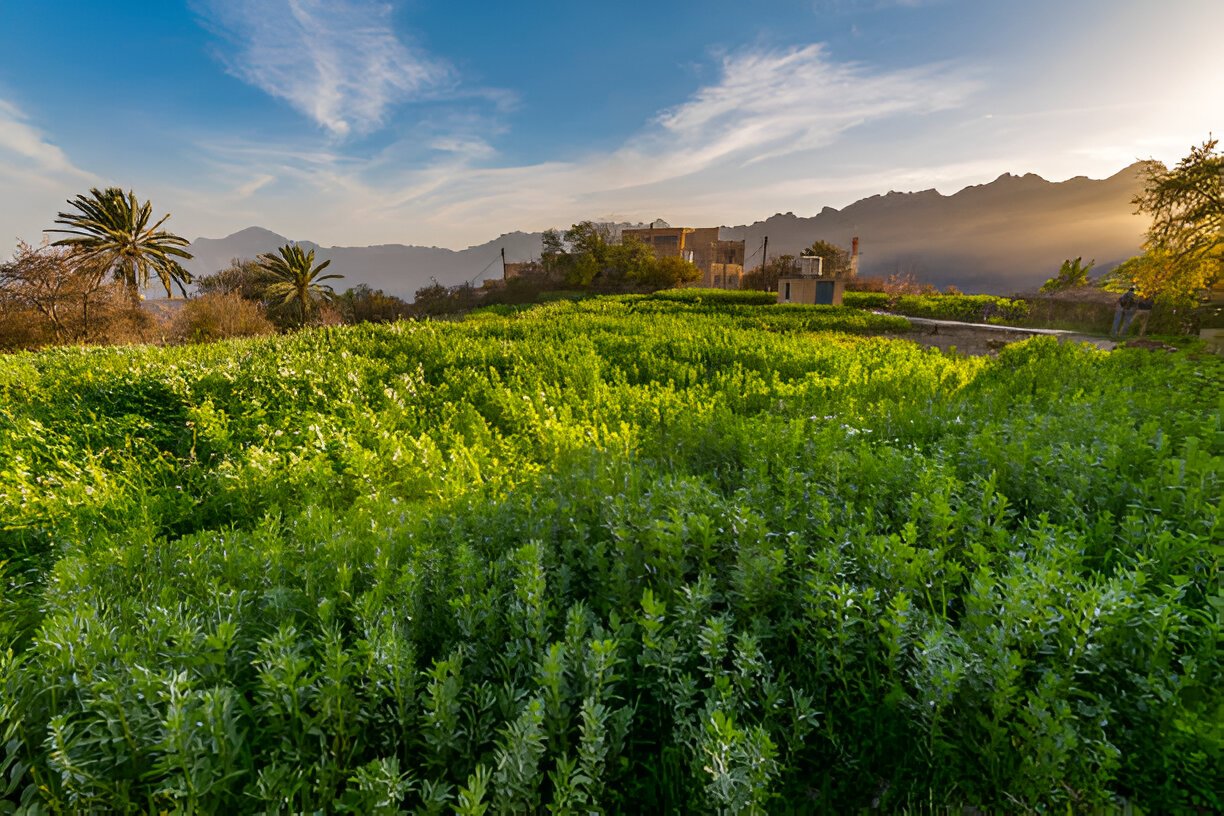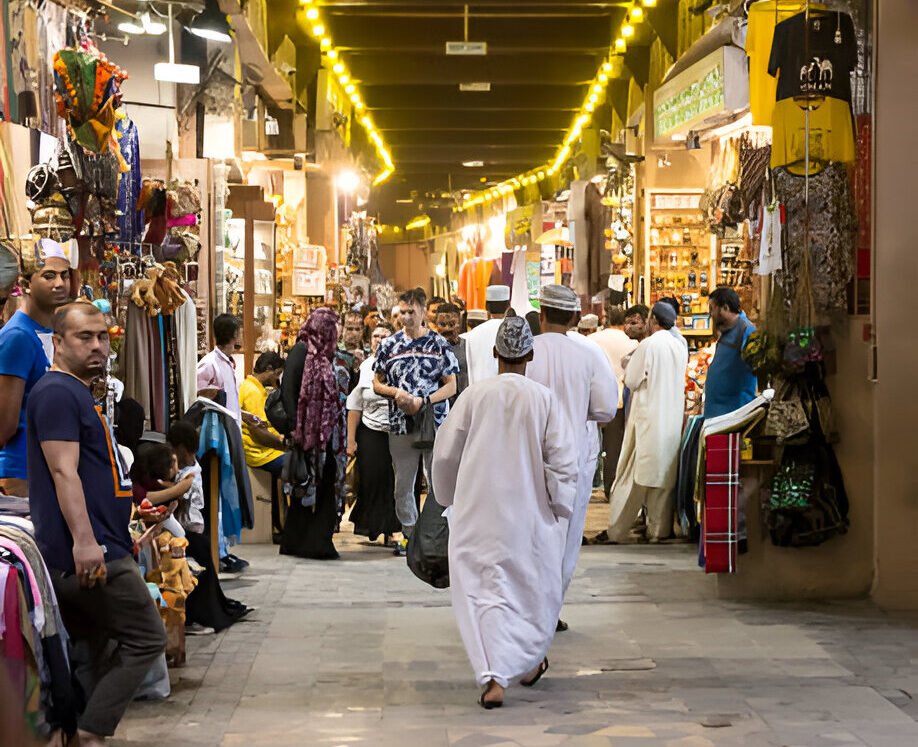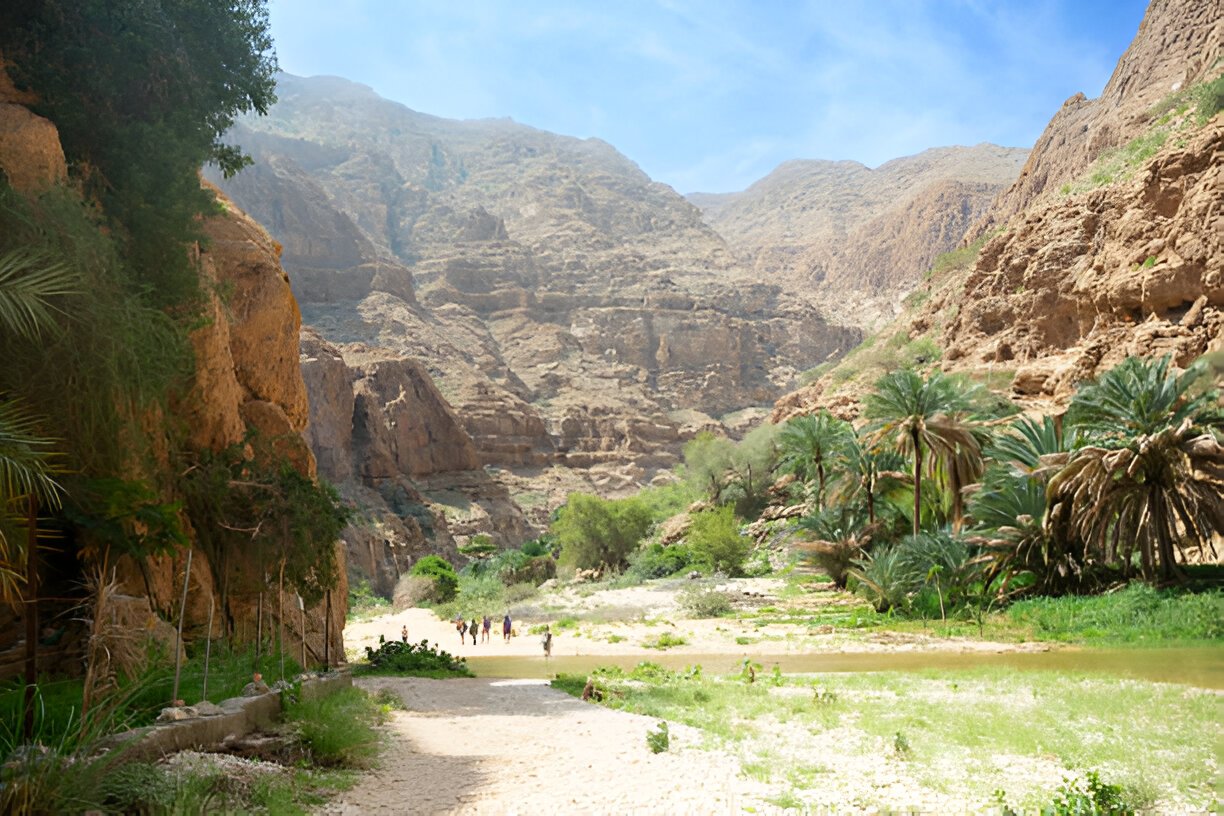
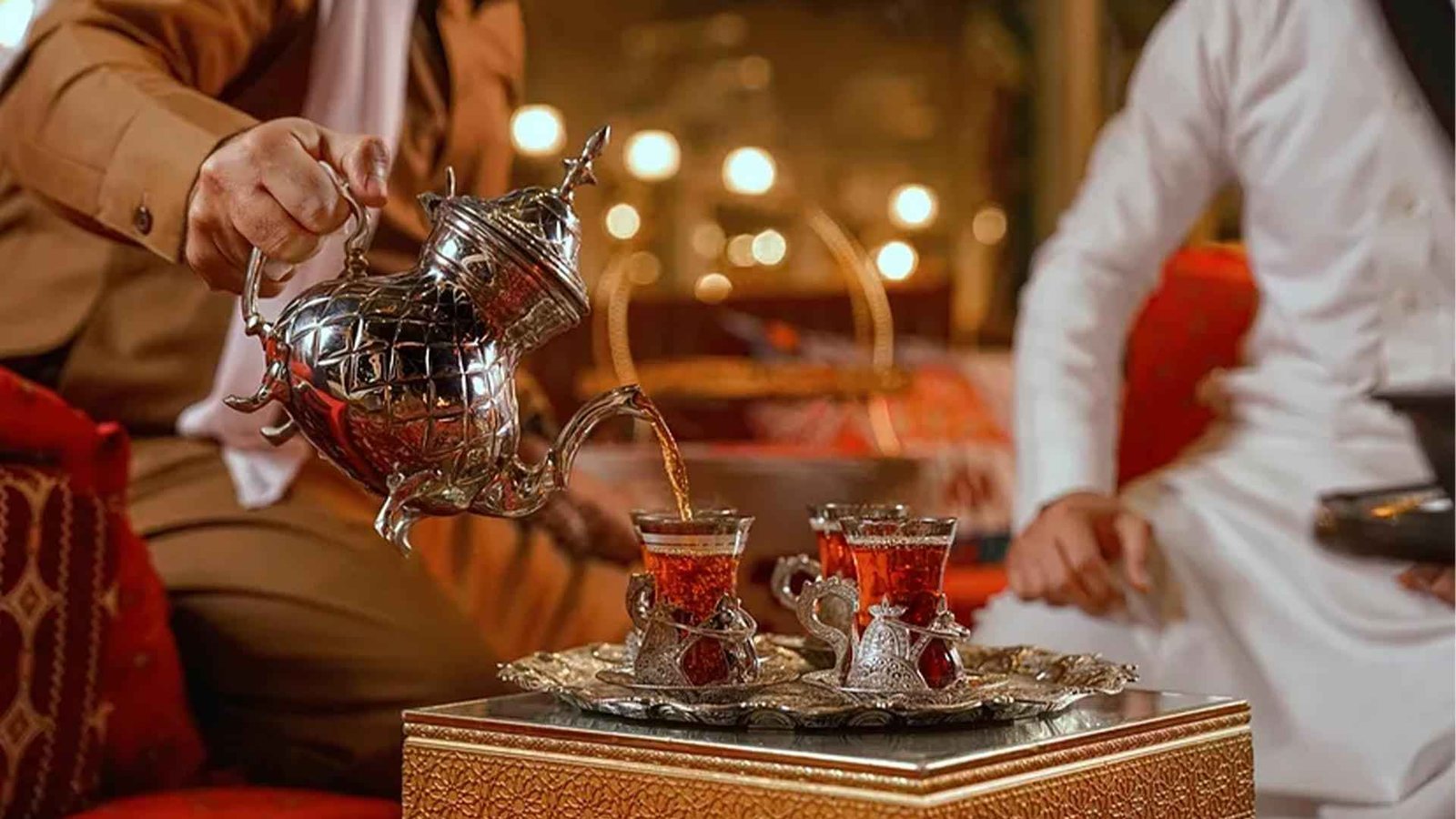
Imagine stepping into a warm, welcoming room where the air is filled with the enticing aroma of freshly brewed coffee, mingled with the rich scents of cardamom and saffron. This isn’t just any coffee; this is Omani coffee, a symbol of hospitality and a cornerstone of Omani culture. The Traditional Omani Coffee Ceremony is more than a ritual—it’s a reflection of the country’s deep-rooted values of respect, community, and tradition. In this article, we’ll explore the rich history, cultural significance, and intricate rituals that make the Omani Coffee Ceremony unique.
Omani coffee, known locally as “Kahwa,” is a lightly spiced coffee that plays a central role in the social and cultural life of Oman. Unlike the strong, bitter coffees common in many parts of the world, Omani coffee is mild, aromatic, and infused with flavors that reflect the country’s history as a hub of the spice trade. The Omani Coffee Ceremony is a time-honored tradition that goes beyond just drinking coffee—it’s about building connections, showing respect, and celebrating togetherness.
In Oman, offering a cup of coffee is not merely about quenching thirst; it is an invitation to share in the warmth and hospitality of our culture
Over the years, coffee has evolved beyond a mere beverage in Oman; it’s become a symbol of hospitality and social interaction. The Omani Coffee Ceremony reflects the country’s values, where offering coffee to guests is a sign of respect and friendship. Whether at home, in a social gathering, or even during business meetings, coffee plays a crucial role in fostering relationships and creating a sense of community.
Coffee is not just served; it is shared. It is a symbol of our unity and the strength of our relationships
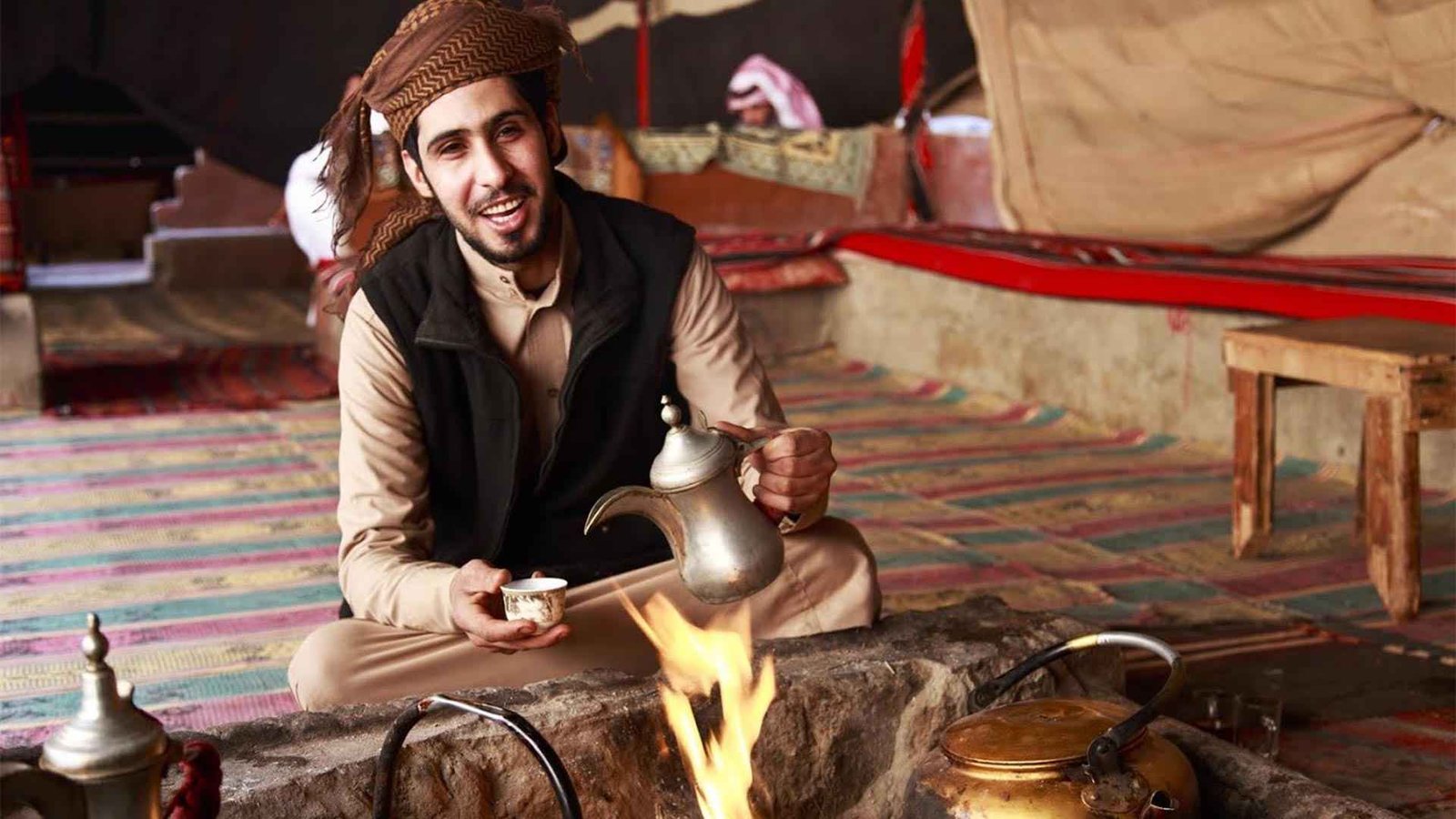
In Oman, serving coffee is one of the highest forms of hospitality. When offered a cup of Omani coffee, it’s not just a drink—it’s an invitation to partake in a tradition passed down through generations. The coffee is usually served with dates, symbolizing warmth, generosity, and the welcoming spirit of the Omani people.
Omani coffee is a staple at social gatherings, where it serves as a bridge between different generations and social groups. The ceremony often begins with the host serving the eldest or most respected guest first, followed by the other guests. This ritual fosters respect and equality among participants, making the ceremony a unifying experience.
The Omani Coffee Ceremony is not just about the drink itself; it's a demonstration of respect, where every guest is honored and valued.
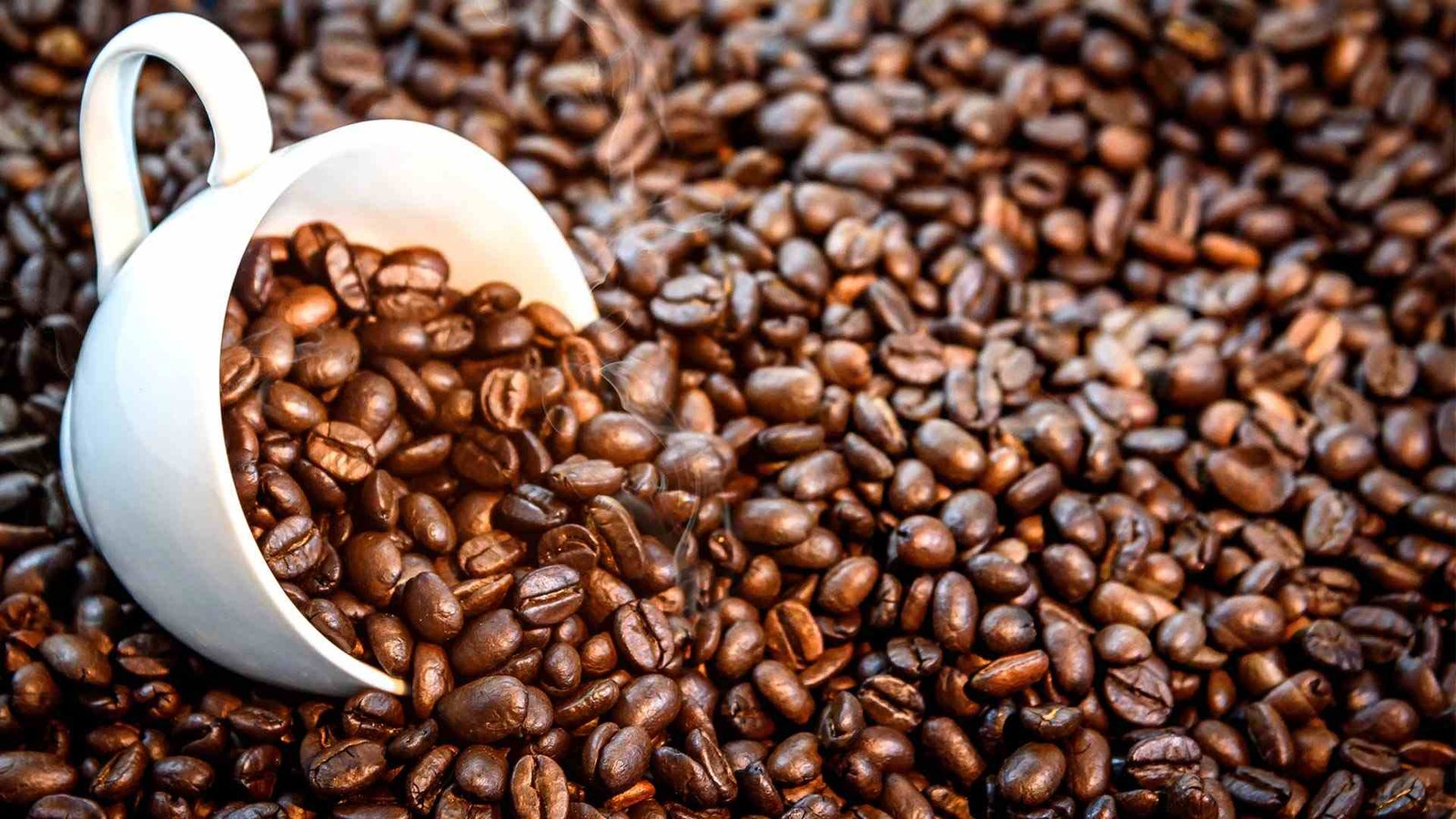
The foundation of any good coffee is, of course, the beans. In Omani coffee, the beans are lightly roasted to maintain a mild flavor that pairs well with the spices added during brewing. The coffee is ground to a fine consistency, which helps extract the delicate flavors when brewed.
The spices are what set Omani coffee apart from other types of coffee. Cardamom is the most commonly used spice, adding a warm, slightly sweet flavor. Saffron is another key ingredient, giving the coffee its golden color and unique aroma. Some variations also include a touch of rosewater for an extra layer of fragrance. These spices not only enhance the flavor but also add a touch of luxury and tradition to the coffee.
The aroma of Omani coffee is unforgettable—it's a blend of history, culture, and a thousand stories passed down through generations.
While the traditional method of preparing Omani coffee is still widely practiced, some modern adaptations have emerged, particularly in urban areas. Electric kettles and modern coffee makers are sometimes used to speed up the process, but the essence of the ceremony remains the same. The key is to preserve the flavor and tradition, regardless of the method used.
Even in the modern world, the heart of the Omani Coffee Ceremony remains untouched—it's a tradition that connects us to our roots.
The host plays a crucial role in the Omani Coffee Ceremony. They are responsible for preparing and serving the coffee, ensuring that each guest is treated with respect and hospitality. The process begins with the host pouring a small amount of coffee into a cup and offering it to the eldest or most respected guest first. This act is a sign of honor and reverence.
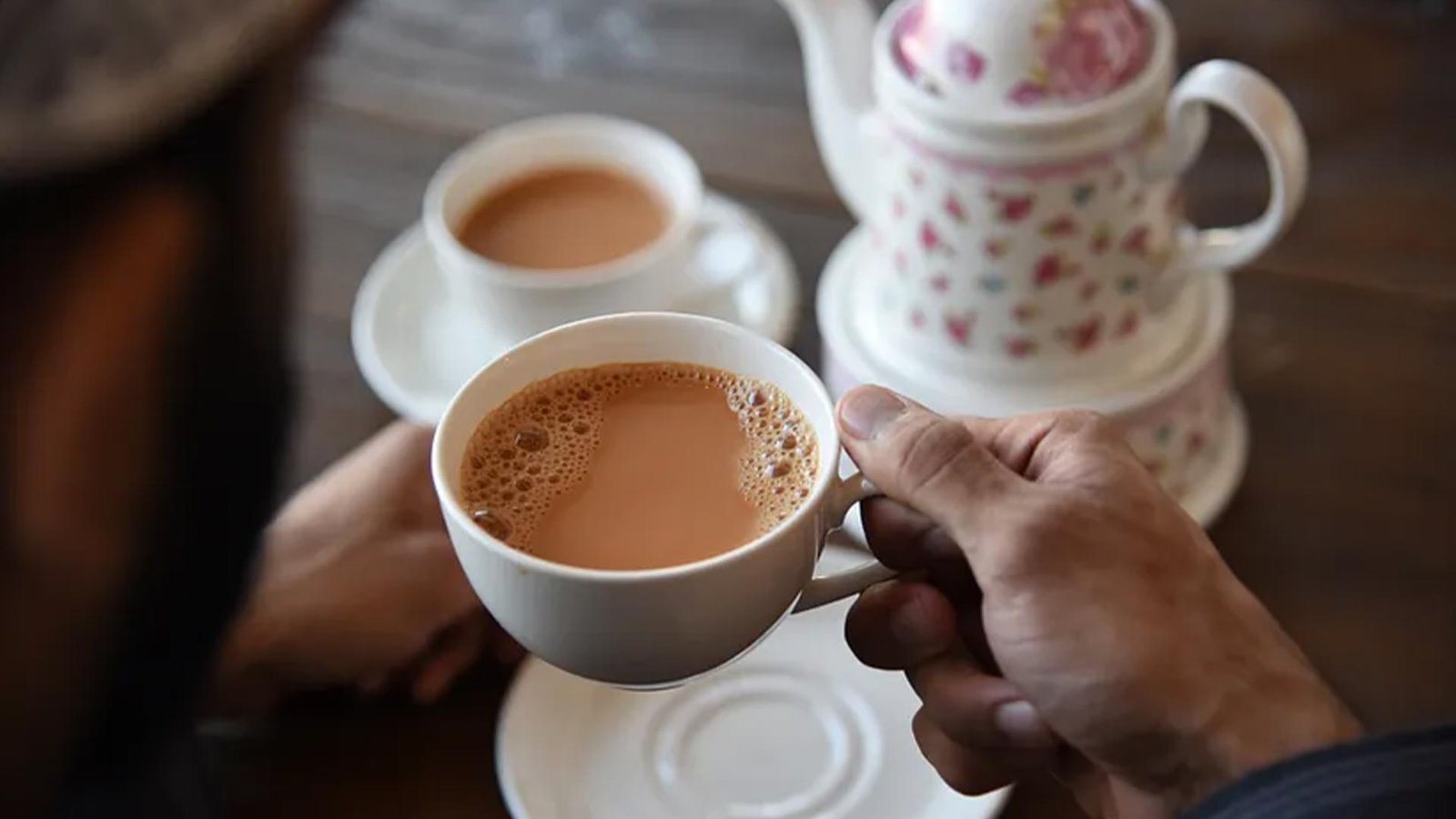
The coffee is typically served in small cups without handles, known as “finjans.” The host pours the coffee from a dallah, a traditional coffee pot, into the finjans, offering the cup with the right hand. Guests are expected to accept the cup with their right hand, take a sip, and return the cup to the host, who will refill it for the next guest. It’s customary for guests to drink three cups of coffee, each cup symbolizing a different blessing.
Serving coffee in Oman is more than just hospitality; it's a way to honor your guests and express deep respect.
In the Omani Coffee Ceremony, specific rules and customs must be observed. For example, the coffee should never be filled to the brim, as this can be seen as a sign of impatience. Instead, the cup is filled halfway, allowing the guest to take a small, measured sip. Complimenting the host on the quality of the coffee is considered polite, and guests are expected to express their appreciation before leaving the gathering.
Guests also have certain responsibilities during the Omani Coffee Ceremony. They should accept the coffee with their right hand and take at least one sip before returning the cup. It’s considered rude to refuse the coffee, as it’s a gesture of hospitality. If a guest does not wish to drink more, they should gently shake the cup from side to side, signaling to the host that they have had enough.
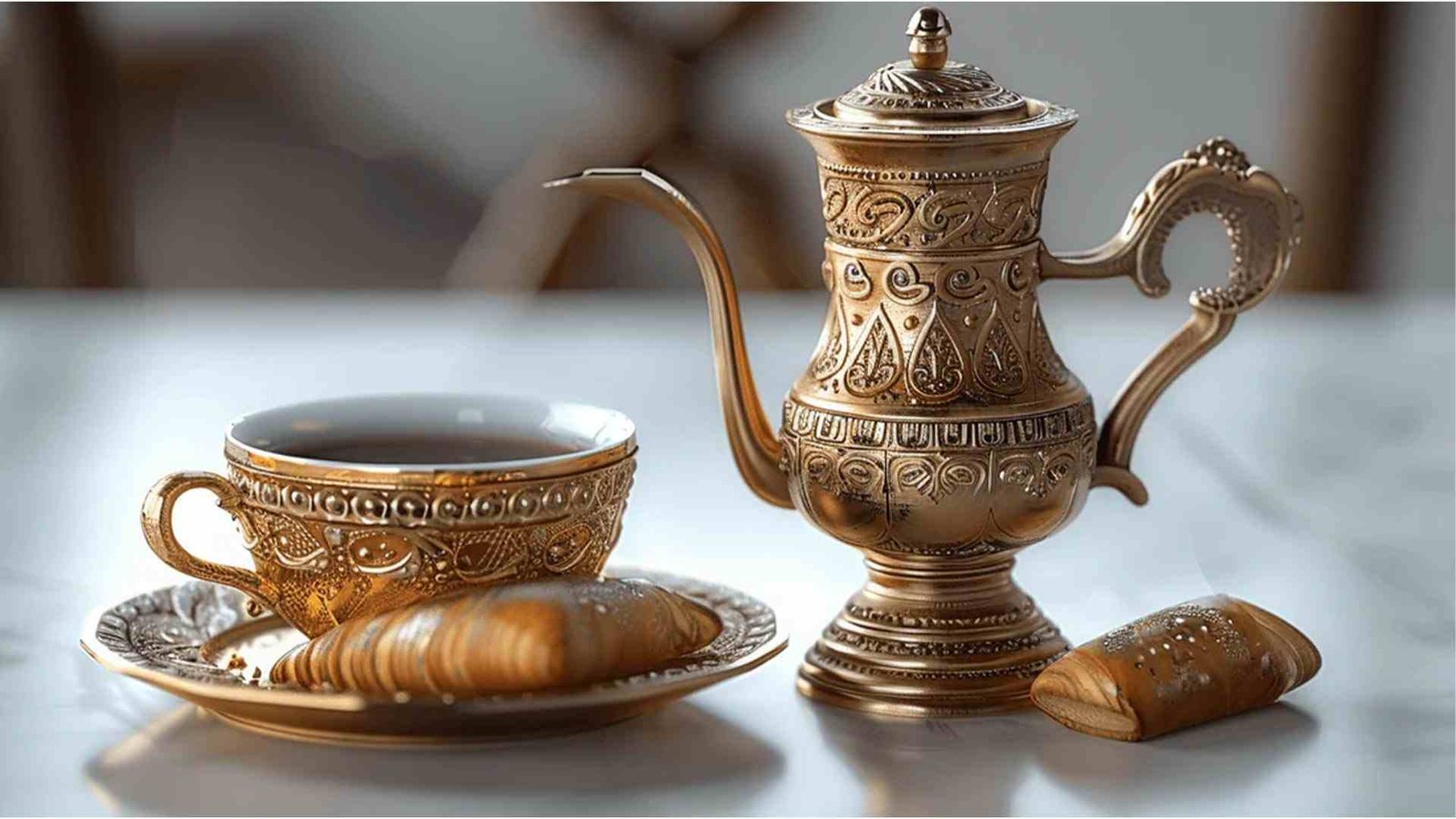
The dallah is more than just a coffee pot; it’s a symbol of Omani heritage and craftsmanship. Traditionally made from brass or copper, the dallah features a curved spout and an ornate handle, often adorned with intricate designs. Each dallah is handmade, making it a unique piece of art that reflects the skills and traditions of Omani artisans.
The dallah is an essential part of the Omani Coffee Ceremony. It’s not only used to brew and serve the coffee but also serves as a symbol of the host’s generosity and hospitality. The act of pouring coffee from the dallah is a ritual in itself, reflecting the care and attention given to each guest.
The dallah is not just a pot; it’s a vessel of tradition, carrying the essence of Omani hospitality in every pour.
In Oman, coffee is traditionally served with dates, a practice that has both cultural and nutritional significance. Dates are a symbol of hospitality and are believed to complement the coffee’s flavors perfectly. The sweetness of the dates balances the mild bitterness of the coffee, creating a harmonious blend that enhances the overall experience.
Oman is known for its high-quality dates, with varieties like Khalas, Fardh, and Khasab being among the most popular. Each type of date has its unique flavor and texture, making them a perfect accompaniment to Omani coffee. The combination of coffee and dates is more than just a treat; it’s a celebration of Omani culture and tradition.
The Omani Coffee Ceremony begins with the careful preparation of the ceremony space. The host arranges the dallah, finjans, and a plate of dates on a tray, ensuring that everything is in place before the guests arrive. The seating area is also prepared, with cushions or chairs arranged in a circle to facilitate conversation and interaction among the guests.
Once the guests are seated, the host begins the ceremony by pouring a small amount of coffee into a finjan and offering it to the eldest or most respected guest. The coffee is poured with a specific hand gesture, and the cup is always presented with the right hand. After the guest takes a sip, the cup is returned to the host, who refills it for the next guest. This process is repeated until all guests have been served.
The Omani Coffee Ceremony is an art, where each pour and each sip is a brushstroke on the canvas of tradition.
As Oman modernizes, the Omani Coffee Ceremony has also evolved, particularly in urban areas. While the traditional ceremony is still practiced, some elements have been adapted to fit modern lifestyles. For example, coffee may be prepared using modern appliances, and the ceremony might take place in a more casual setting. However, the core values of hospitality and respect remain unchanged.
The influence of Omani coffee has spread beyond Oman’s borders, with the unique flavors and customs being celebrated in various parts of the world. Omani coffee shops have opened in major cities, offering people a chance to experience the tradition firsthand. This global appreciation of Omani coffee is a testament to its cultural significance and enduring appeal.
As Oman continues to develop, there is a growing effort to preserve traditional practices like the Omani Coffee Ceremony. Cultural organizations and community groups are working to ensure that these traditions are passed down to future generations, keeping the spirit of Omani coffee alive. These efforts include educational programs, cultural festivals, and the promotion of Omani coffee on the global stage.
The future of Omani coffee traditions looks bright, as more people around the world discover the unique flavors and cultural significance of this traditional brew. Whether enjoyed in a traditional setting or a modern cafe, Omani coffee continues to be a symbol of hospitality, warmth, and community. As Oman embraces the future, the Omani Coffee Ceremony will undoubtedly remain a cherished part of the country’s cultural heritage.
The Omani Coffee Ceremony is a legacy of warmth, passed down through generations and shared with the world.
The Traditional Omani Coffee Ceremony is more than just a way to enjoy a cup of coffee; it’s a celebration of Omani culture, tradition, and hospitality. Through the careful preparation of the coffee, the rituals of serving, and the shared experience of enjoying the brew, the ceremony fosters a sense of connection and respect among participants. Whether you’re in Oman or anywhere else in the world, participating in an Omani Coffee Ceremony is a reminder of the importance of community and the simple pleasures that bring people together.
The key ingredients in Omani coffee include lightly roasted coffee beans, cardamom, saffron, and sometimes rosewater. These ingredients give Omani coffee its distinctive flavor and aroma
The Omani coffee ceremony has been practiced for centuries, with its roots tracing back to Oman’s role as a major trading hub. The ceremony has been passed down through generations, remaining an integral part of Omani culture.
Omani coffee is different from other types of coffee due to its mild flavor and the use of aromatic spices like cardamom and saffron. It’s also served in small cups and often accompanied by dates, which enhances the overall experience.
The Dallah is important in the Omani coffee ceremony because it’s not only used to brew and serve coffee but also serves as a symbol of hospitality and tradition. The Dallah’s design and craftsmanship reflect the cultural heritage of Oman.
Omani coffee is traditionally served in small cups without handles and is known as finjans. The host pours the coffee from a dallah and offers it to the eldest or most respected guest first, before serving the other guests. The ceremony is a symbol of respect and hospitality.
Never miss any important news. Subscribe to our newsletter.

